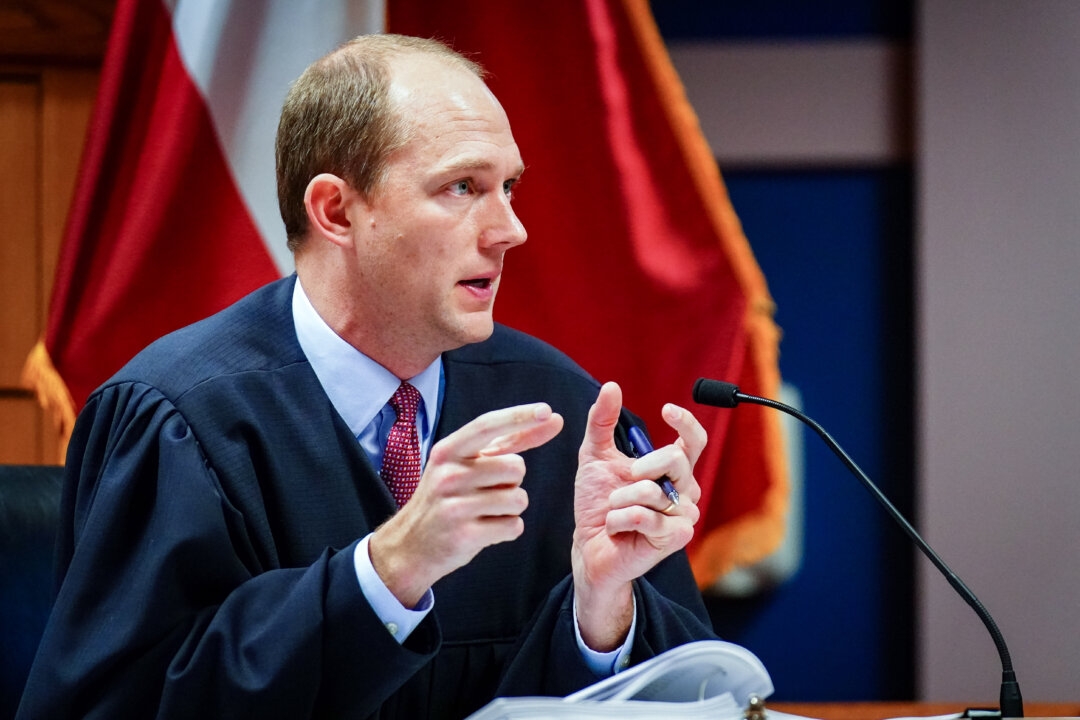‘The lack of detail concerning an essential legal element is, in the undersigned’s opinion, fatal.’

By Catherine Yang | Epoch Times
Fulton County Superior Court Judge Scott McAfee on March 13 ruled on several demurrers in the case against former President Donald Trump and 14 codefendants, striking six counts from the 41-count indictment against them.
The demurrers, or formal challenges to pleadings by the prosecution, were brought by President Trump, former White House chief-of-staff Mark Meadows, and attorneys John Eastman, Ray Smith III, Robert Cheeley, and Rudy Giuliani.
Three of the quashed charges apply to President Trump, throwing out counts related to a phone call he made to the Georgia Secretary of State.
The indictment originally charged 19 defendants, four of whom have since taken plea bargains. All were charged with violating Georgia’s Racketeer Influenced and Corrupt Organizations (RICO) Act and with 40 additional counts.
The ruling comes ahead of an expected decision this week on a motion to disqualify Fulton County District Attorney Fani Willis from prosecuting the case.
Quashed Charges
The judge struck charges 2, 5, 6, 23, 28, and 38 from the indictment. These counts are related to soliciting officials to violate oaths of office, including via a phone call that President Trump made to Georgia Secretary of State Brad Raffensperger.
The counts alleged that the defendants solicited members of the Georgia Senate and Georgia House, the Georgia House Speaker, and Mr. Raffensperger to violate oaths of office in trying to certify alternate electors or “influence the certified election returns.”
This leaves only the RICO charge for Mr. Meadows, 10 counts for President Trump, 11 counts for Mr. Giuliani, 10 counts for Mr. Smith, nine counts for Mr. Cheeley, and eight counts for Mr. Eastman.
The judge added that “these pleading deficiencies do not apply to the corresponding acts” listed in the RICO charge as part of an alleged conspiracy.
“A defendant can be found guilty of conspiracy even after acquittal of any overt acts alleged,” Judge McAfee wrote.
The RICO charge stands, and the indictment as a whole is not dismissed. The judge found that the defendants did not provide authority requiring the acts to be struck from the racketeering charge.
The judge wrote, quoting precedent, that a “special demurrer is akin to a ’motion for a more definite statement,’” and the removal of these charges was necessary at the time to protect due process rights.
The “oaths” in the charges were not “expressly prescribed,” as required by state law, the judge pointed out, and thus the charges were too vague to stand separately.
The officers in question have sworn different oaths, but they are charged in separate counts making the omission of the oaths “legally harmless,” the judge wrote. However, the indictment also does not detail what parts of the oath the defendants allegedly solicited the officers to violate.
The charges only reference the U.S. and Georgia Constitutions in relation to the oaths, which the judge found far too “generic,” as each document contains hundreds of clauses subject to “dramatically different” interpretations.
“The Court’s concern is less that the State has failed to allege sufficient conduct of the Defendants—in fact it has alleged an abundance,” Judge McAfee wrote. “However, the lack of detail concerning an essential legal element is, in the undersigned’s opinion, fatal.”
The judge explained that the failure to include detail means defendants do not have “enough information to prepare their defenses intelligently.”
Crucially, the judge did not dismiss all of the charges that the defendants challenged, which had also included the RICO count. Mr. Cheeley had filed a special demurrer for count 23, which also pertained to “solicitation of violation of oath by public officer,” but the judge found that there was a link between the Georgia Senate and duties to appoint presidential electors.
In a footnote, the judge added that the prosecutors are allowed to seek indictment for the six counts, and gave a deadline of six months to resubmit the case to a grand jury.
The state is also allowed to seek review of Judge McAfee’s decision, “which the Court would likely grant due to the lack of precedential authority,” he noted.

